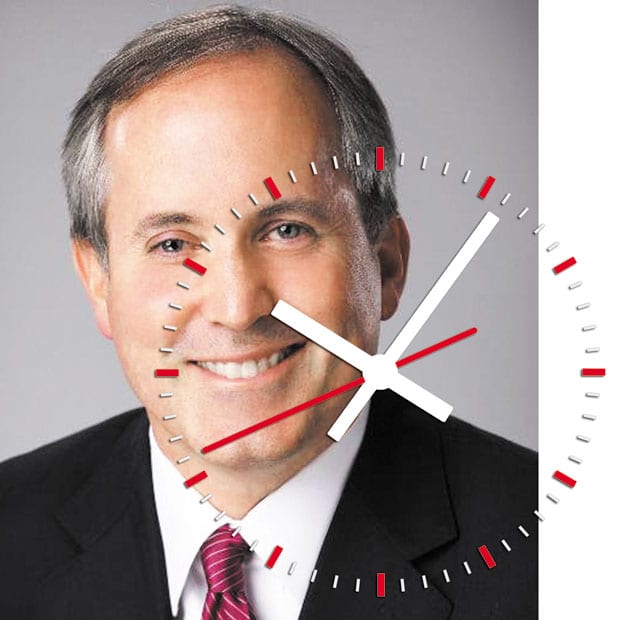A.G. has until Aug. 24 to issue new guidelines for issuing birth and death certificates to same-sex couples

DAVID TAFFET | Senior Staff Writer
Texas Attorney General Ken Paxton’s refusal to issue an amended death certificate to a man who lost his husband in January will result in many same-sex couples getting both names on their children’s birth certificates, but could still impose a contempt citation against the embattled Republican.
Paxton’s legal troubles relate to an order issued by a federal judge in San Antonio. The contempt hearing was to take place on earlier this week, but the judge extended time for the attorney general to comply before issuing the contempt order.
Attorney Neel Lane filed the motion that resulted in the new ruling. In 2014, Lane represented two couples seeking to overturn the Texas marriage amendment.
Judge Orlando Garcia found in their favor in February 2014. After the U.S. Supreme Court ruled in the Obergefell marriage-equality decision in June, the Fifth Circuit Court of Appeals affirmed Garcia’s ruling.
When John Stone-Hoskins died in January, James Stone-Hoskins was listed as “significant other.” After SCOTUS’ Obergefell decision, he tried to get the death certificate amended to read “husband.” When Texas refused, he approached Lane for help.
Rather than Stone-Hoskins filing a new lawsuit, he approached Lane to file a motion in the Texas marriage case in Garcia’s court.
Garcia ruled the death certificate must be amended immediately and charged Paxton and the interim commissioner of state health services with contempt of court for obstructing implementation of the marriage-equality ruling.
Before charging Paxton with contempt, Garcia asked Lane if there were other areas the state was not complying with his marriage-equality ruling. Lane said same-sex couples were still being discriminated against for purposes of recognizing both parents on the birth certificate. Garcia added that to his order.
Lane said Garcia seemed intent on taking care of any other loose ends once and for all.
Paxton agreed to issue new guidelines to state employees in order to avoid having to appear in court on contempt charges. Garcia rescheduled the hearing date until Sept. 10, pending those orders being issued.
On Aug. 11, he gave Paxton until Aug. 24 to issue the guidelines.
Lane said since he’s not a family law attorney, he said he planned to ask other attorneys such as Lambda Legal’s Ken Upton and Austin attorney Suzanne Bryant, who specializes in second parent adoptions, to look over the document.
By Aug. 12, Texas was issuing amended death certificates to a spouse whose out-of-state marriages predated the Obergefell decision.
Paxton’s office said there would be a delay in amending birth certificates because of updates needed for the software by a third-party vendor.
Lane wasn’t sure which couples would be able to amend their children’s birth certificates. Under Texas law, the birth certificate begins with the birth mother and that the spouse is the presumed second parent.
He said he thought the easiest cases would be lesbians who gave birth. Her wife would be the presumed second parent.
He wasn’t sure how that would work with male couples who used a surrogate. The mother would still have to go to court to end parental rights. The biological father should be listed as the father and then his husband should be the presumed second parent.
Married opposite-sex couples adopt at the same time. Before Obergefell, Texas would allow single-parent adoptions and then a costly second-parent adoption later, and only in a few counties, including Dallas, where judges would do it.
Same-sex married couples should now be able to adopt together. For purposes of amended birth certificates, opposite-sex couples are place on the document. After guidelines are issued, same-sex couples should get that same protection.
However, couples who weren’t married before having their children will probably have to continue with second-parent adoptions and may not be listed on their children’s birth certificates.
Lane said he would be happy as long as they’re the same for all married couples are treated equally.
This article appeared in the Dallas Voice print edition August 14, 2015.

